Oatey’s sponsorship enabled significant HVAC and plumbing repairs for Air Force veteran with disabilities Oatey Co., a leading plumbing manufacturer since 1916, recently partnered with nonprofit organization Miracle Mechanical to make one deserving veteran’s hope a reality through significant HVAC and plumbing repairs. Miracle Mechanical was founded by contractor Brent Ridley with the mission of uplifting families Read more
HVAC
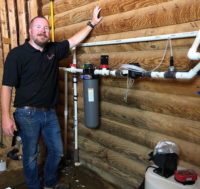
Oatey’s sponsorship enabled significant HVAC and plumbing repairs for Air Force veteran with disabilities
Oatey Co., a leading plumbing manufacturer since 1916, recently partnered with nonprofit organization Miracle Mechanical to make one deserving veteran’s hope a reality through significant HVAC and plumbing repairs.
Miracle Mechanical was founded by contractor Brent Ridley with the mission of uplifting families and communities through plumbing and HVAC repairs at no cost to recipients.
“The whole premise of Miracle Mechanical is to help veterans with disabilities, elderly people and those in need,” says Ridley. “Generous sponsors like Oatey give us the means to transform people’s everyday quality of life.”
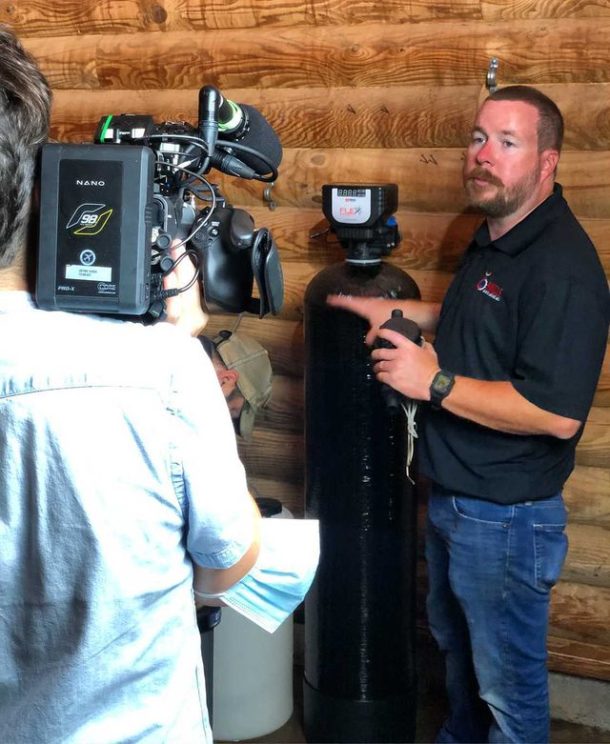
Brent Ridley founder of Miracle Mechanical. He founded Miracle Mechanical with the mission of uplifting families and communities through plumbing and HVAC repairs at no cost to recipients.
The recent Oatey-sponsored Miracle Mechanical project provided much-needed help to Cindy Koehler, a U.S. Air Force veteran who has battled multiple sclerosis (MS) and debilitating physical challenges for the past three decades. Koehler lacked clean drinking water for several years due to her home’s failing water filtration system. Rust, germs and other dangerous contaminants polluted the household water supply, making it completely unsafe to consume.
Through Oatey’s sponsorship, Ridley’s team was able to purchase and install brand new appliances, including an electric water heater, two ADA-compliant toilets and a state-the-art water filtration system – ensuring Cindy and her family have access to the best quality water.
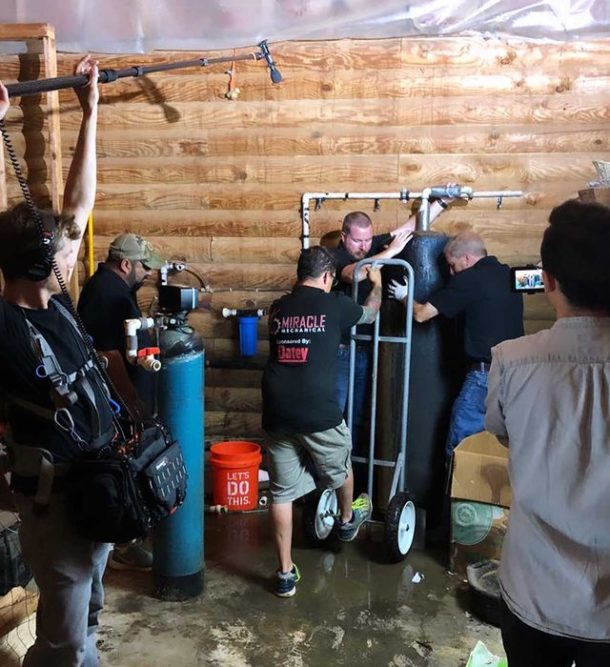
The recent Oatey-sponsored Miracle Mechanical project provided much-needed help to Cindy Koehler, a U.S. Air Force veteran who has battled multiple sclerosis (MS) and debilitating physical challenges for the past three decades.
“Something as simple as clean running water, being able to flush a toilet and wash dishes brought tears in my eyes and joy to my heart,” says Koehler. “Never in my wildest dreams did I think this would happen.”
“Improving lives is a core tenet of our mission here at Oatey,” explains Katherine Lehtinen, Oatey’s Senior Vice President, Brand & Digital Marketing. “When we heard about Cindy’s story, we were thrilled to have the opportunity to help. We’re honored to be a part of such an impactful project and make such a big difference for the U.S. Air Force veteran.”
Recognized for his outstanding leadership and dedication to his students at Norfolk Technical Center in Virginia, Anthony Bertolino was named the Plumbing-Heating-Cooling Contractors—National Association’s (PHCC’s) 2021 Plumbing Instructor of the Year. The award – sponsored by PHCC Corporate Partner Milwaukee Tool – was presented this week during PHCCCONNECT2021, the association’s annual conference, held in Kansas Read more
Recognized for his outstanding leadership and dedication to his students at Norfolk Technical Center in Virginia, Anthony Bertolino was named the Plumbing-Heating-Cooling Contractors—National Association’s (PHCC’s) 2021 Plumbing Instructor of the Year. The award – sponsored by PHCC Corporate Partner Milwaukee Tool – was presented this week during PHCCCONNECT2021, the association’s annual conference, held in Kansas City, Missouri.
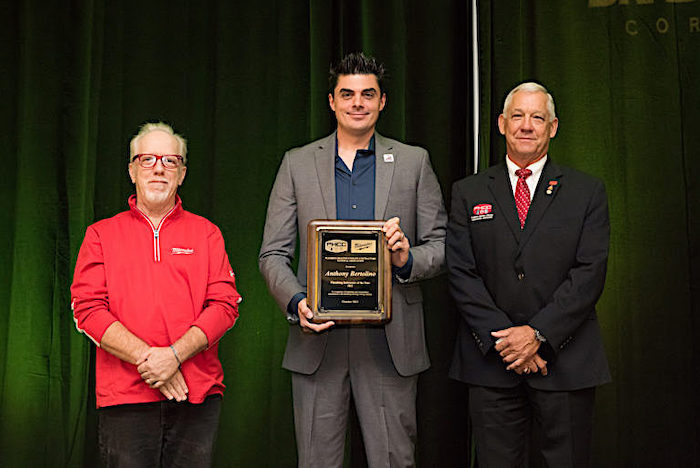
“The instructors in the p-h-c field play a crucial role in developing tomorrow’s workers,” said 2020-2021 PHCC President Hunter Botto during the award presentation. “We are fortunate to have high-caliber men and women who devote their time – both on and off the clock – to prepare students for rewarding careers in our industry.”
Bertolino is “an exceptional teacher and role model for his students,” added Botto. In addition to running Bertolino Plumbing & Heating in Virginia Beach, Virginia, with this brother, he teaches all four years of plumbing apprenticeship at Norfolk Technical Center. He has dramatically improved both the retention rate for each class and the number of students, and his program is one of the largest in Virginia.
Ironically, Bertolino did not originally plan to become a plumber but rather study business in college and become a floor trader in New York City. After his father, a licensed plumbing contractor, explained the expenses involved with that plan, however, Bertolino considered plumbing. He enrolled in an apprenticeship program, earned his journeyman’s license, and – less than two years later – received his masters’ licenses.
This is one of the first stories Bertolino shares with his students. “I tell them that I have no student debt; I own my own business; and I really enjoy what I do,” he said. “I also tell them how much I have learned and that this is the career I chose.”
As an instructor, Bertolino’s effectiveness is more than charisma and straight talk, however. He incorporates the Montessori method of education that is based on self-directed activity, hands-on learning, and collaborative play. He engages students by sharing examples of his own on-the-job challenges and encourages them to discuss their work experiences to help advance the entire class.
“Tony’s students know that he expects them to apply their classroom knowledge to the day-to-day work and that licensure is the mark of professionalism,” Botto said during the award presentation. “He reminds them of the importance of plumbing to the health and safety of the nation.”
Bertolino’s connection with his students doesn’t end when their apprenticeships are completed; he stays in touch with many of them for years and keeps a collection of stories about the good things they have done in the trade. PHCC and Milwaukee Tool proudly recognized Bertolino’s ongoing commitment to these young professionals with this Plumbing Instructor of the Year award.
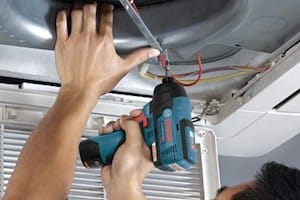
Before closing the final contract, the buyer does a USA house inspection to check for any flaws or critical concerns with the property. The professional home inspector’s written report includes a wide range of topics, including roof conditions, structural strength, electrical and plumbing testing, and sewer scope. It gives the buyer some peace of mind Read more
Before closing the final contract, the buyer does a USA house inspection to check for any flaws or critical concerns with the property. The professional home inspector’s written report includes a wide range of topics, including roof conditions, structural strength, electrical and plumbing testing, and sewer scope. It gives the buyer some peace of mind, allowing them to haggle over the price, make repairs, or cancel the transaction altogether if it isn’t right for them.
It may be tough to get a house inspector in the United States that can provide you with entirely neutral information on the property. With these considerations in mind, you will be able to choose a fantastic USA house inspector on whom you can rely to make the final decision.
Don’t take a real estate agent’s recommendation at face value
A USA house inspector who has been suggested by your realtor may feel forced to provide a light examination. Because the agent’s goal is to conclude the sale as quickly as feasible. This is why real estate inspections are done. This way, home buyers have a knowledgeable professional on their side, looking out for their interests.
Verify that the candidates are competent and reliable
A home inspector can be located by contacting professional organizations like the American Society of Home Inspectors (ASHI), the International Association of Certified Home Inspectors (InterNACHI), or the National Academy of Building Inspection Engineers, certified professional engineers and architects who perform home inspections in the United States.
Visit the group’s website to learn more about the expertise and credentials of its member inspectors, as well as the services they provide. Do a web search for the firm with which the inspectors are affiliated, as well as reviews from former clients. Also, respect his qualifications, but be aware of their limitations.
Take your education and experience into account
Look for someone who has spent years analyzing properties in the same area, in addition to professional credentials and accreditations. He’s more likely to have encountered a variety of different types of homes and issues.
Compare US Home Inspection Reports
Request a sample copy of the instructor’s past USA home inspection reports. Compare the reports to those of other home inspectors, based on the tests, screening, time spent, and level of information in their observations.
Find out what you receive for your money
The cost of an inspection varies based on the extent of the examination and the inspection equipment employed. Inquire about any hidden fees and complimentary services.
What Questions Should You Ask a Home Inspector?
The price of a house inspector and the degree of accuracy of a USA home inspection are determined by the questions asked of them. The following are some questions to ask a home inspector to assure the house’s safety or recompense (if necessary) from the seller in price:
Do you (the home inspector) have any credentials?
Inquire about the home inspector’s professional organization, qualifications, certifications, insurance, and experience in the USA house inspection sector for the location in question.
What is the roof’s condition?
Inquire about the shingles’ condition when your home inspector is inspecting the roof. Are there any asphalt particles accumulating in the gutters? Are there any obvious indications of wear and tear? If this is the case, the roof may need to be replaced.
Is the house adequately insulated?
Your heating and cooling bills will be affected by how effectively your property is insulated. To keep heat from fleeing the house, the attic should be effectively insulated. Is there any type of insulation used? If asbestos is present in vermiculite insulation, it can pose a major health danger if disturbed. Is there adequate ventilation in the attic? How well insulated is the basement? Appropriate insulation materials used or not?
How is the electrical situation?
Because electrical fires are prevalent, you should have your home inspector evaluate the electrical system. Is it code-compliant? Is there anything that’s worn out? Was the electrical work done by a certified electrician if there were any upgrades? Are GFCI outlets present in areas where water is present, such as the kitchen, baths, garage, and outdoor areas? Are there any cables that are exposed or damaged?
How is the plumbing situation?
Drains, water heaters, pipelines, water pressure, and temperature will all be examined by a home inspector. How does each faucet’s water flow? Is everything draining correctly? Are the tubs suitably secured? Are the tubs suitably secured? Any water stains on the flooring or ceiling should be noted by your home inspector since they might signal a plumbing issue. Inquire about any galvanized steel pipe in the house, since it can corrode and decrease water pressure, or even burst. Is there any lead pipe in the house?
Is the structure of the house sound?
The foundation of the house will be examined by a home inspector. Inquire about any fractures discovered. If foundation cracks are detected, determine what type they are – step, vertical, horizontal, along walls, or in the basement floor.
What is the status of the HVAC system?
The home’s heating, ventilation, and air-conditioning system (HVAC) will be examined during the inspection to ensure that it is in working order. Inquire about the age of the air conditioner and how long it should last. Has the furnace been serviced and maintained properly?
What is the state of the outside drainage?
Are there any puddles that have formed? This might be a sign of a water problem. Are there any downspouts missing? Are all the downspouts directed away from the base of the house? Improper drainage and grading can result in expensive foundation problems.
Do you see any mice or other critters?
If an infestation is suspected, inquire. Mice and other rodents can wreak havoc on homes and businesses.
Conclusion:
Choosing a home inspector is part of the home buying process (which involves a complete inspection of the property). The home inspector’s findings can impact your decision. Therefore, it’s important to choose the right professional for the job. The simple process of interviewing a candidate for a local home inspector job entails asking about his value for services, credentials, certification, experience, and report comparison. And the questions that you ask about the property condition will be a deciding factor for his fees and expenses.
Second Acquisition for Bonney in the Skilled Trades Industry Sacramento, Calif. — Bonney Plumbing, Electrical, Heating and Air (Bonney), a home services company headquartered in Rancho Cordova, CA, announced it has acquired Sacramento-based Boyd Plumbing, Inc. Boyd has been a trusted provider of plumbing services to the Sacramento area and its neighboring communities since 2006 Read more
Second Acquisition for Bonney in the Skilled Trades Industry
Sacramento, Calif. — Bonney Plumbing, Electrical, Heating and Air (Bonney), a home services company headquartered in Rancho Cordova, CA, announced it has acquired Sacramento-based Boyd Plumbing, Inc. Boyd has been a trusted provider of plumbing services to the Sacramento area and its neighboring communities since 2006.
Under the partnership, Boyd Plumbing will fold in with Bonney, expanding the plumbing team to service nine counties including Sacramento, Sutter, Placer, El Dorado, Amador, Calaveras, San Joaquin, Solano and Yolo. Customers will continue to experience great work by the region’s most trusted professionals in the industry with a minor brand uplift to fit in with the look of Bonney’s signature technicians.
“Boyd Plumbing is at the top of their game and by merging, we have assembled the best plumbing team in the Sacramento region and will continue to provide superior customer service to the communities we serve, “Jeremy Macdonald, Chief Executive Officer of Bonney. “Boyd has an excellent reputation and this purchase aligns with Bonney’s long-term goal of building the best home services company in Northern California.”
“As the need for talented technicians is on the rise, a partnership with Bonney is ideal to continue to serve this community and focus on employee growth and success.” said Michael Boyd, CEO of Boyd Plumbing. “Our companies are not only a great cultural fit, but also have both long delivered excellent results to our clients here in the Sacramento area.”
Bonney plans to invest in several founder-owned companies over the next few years to build a regional leader in home services. To that end, in September Bonney acquired Concord-based Big Air Heating & Air Conditioning, expanding their territory into the Bay Area.

Lennox and dealer network complete Feel The Love Week, providing essential heating and cooling equipment and installations to deserving homeowners at no cost. Lennox Industries proudly partnered with HVAC dealers across the U.S. and Canada to install 130 HVAC units in 37 U.S. states and 5 Canadian provinces as part of the company’s Feel The Love program. Selected homeowners Read more
Lennox and dealer network complete Feel The Love Week, providing essential heating and cooling equipment and installations to deserving homeowners at no cost.
 Lennox Industries proudly partnered with HVAC dealers across the U.S. and Canada to install 130 HVAC units in 37 U.S. states and 5 Canadian provinces as part of the company’s Feel The Love program. Selected homeowners received heating and cooling equipment free of charge throughout the second week of October in Lennox’ first, week-long installation event.
Lennox Industries proudly partnered with HVAC dealers across the U.S. and Canada to install 130 HVAC units in 37 U.S. states and 5 Canadian provinces as part of the company’s Feel The Love program. Selected homeowners received heating and cooling equipment free of charge throughout the second week of October in Lennox’ first, week-long installation event.
Each Feel The Love recipient is an unsung hero who may be going through hardship, facing adversity or in need of community support. Recipients were nominated by their neighbors, friends and family members as a way of bringing hope and support to homes across North America. In 2021, Lennox continued to expand the Feel The Love program to honor essential and frontline workers who went above and beyond to keep their communities safe during the COVID-19 pandemic.
 “We greatly appreciate Lennox for choosing us to be a part of this wonderful program,” said Courtney Johnson, Dallas Hope Center’s housing manager and 2021 Feel The Love recipient. “The installation definitely put a lot of smiles on our board members faces, our CEO’s and on mine as the housing manager. There are a lot of things that are needed in the community, and having the organization see those needs and act is very imperative and exciting. I’m very grateful to be a part of it.”
“We greatly appreciate Lennox for choosing us to be a part of this wonderful program,” said Courtney Johnson, Dallas Hope Center’s housing manager and 2021 Feel The Love recipient. “The installation definitely put a lot of smiles on our board members faces, our CEO’s and on mine as the housing manager. There are a lot of things that are needed in the community, and having the organization see those needs and act is very imperative and exciting. I’m very grateful to be a part of it.”
The Feel The Love program is made possible through the ongoing partnership of the Lennox dealer network across North America. Since the inaugural Feel The Love program in 2009, Lennox and its dealers have completed over 1,600 free installations, with 130 installations occurring in 2021 alone. Every donated unit comes complete with 3-year Comfort Shield Labor Protection Plans, and Feel The Love dealers donate their time and labor to make the program a success.
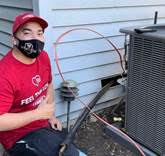 “At Lennox, we believe everyone deserves clean, perfect air, and we’re dedicated to making sure everyone feels safe and comfortable in their own homes,” said Kim McGill, Vice President of Marketing at Lennox Industries. “Through our Feel The Love program, we honor local heroes in the communities where we work and live and are proud to give those in need the perfect air they deserve, thanks to the collaboration and generosity of our dealer partners.”
“At Lennox, we believe everyone deserves clean, perfect air, and we’re dedicated to making sure everyone feels safe and comfortable in their own homes,” said Kim McGill, Vice President of Marketing at Lennox Industries. “Through our Feel The Love program, we honor local heroes in the communities where we work and live and are proud to give those in need the perfect air they deserve, thanks to the collaboration and generosity of our dealer partners.”
For more information about the Feel The Love program and its impact on the community, visit FeelTheLove.com.
About Feel The Love™
Since 2009, Feel The Love (formally known as Heat U.P.) has been a key program for Lennox Industries to give back to its communities. Culminating in Feel The Love Week, Lennox partners with HVAC installers and local community members in the United States and portions of Canada to deliver units at no cost to people who consistently put others before themselves and need a helping hand. For more information about how Lennox is bringing perfect air to deserving households across the United States and Canada, visit FeelTheLove.com.
